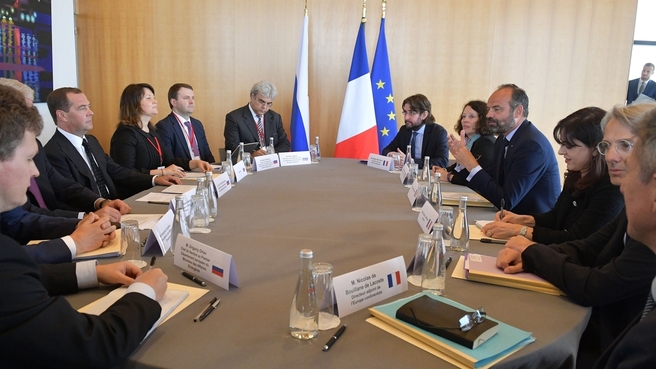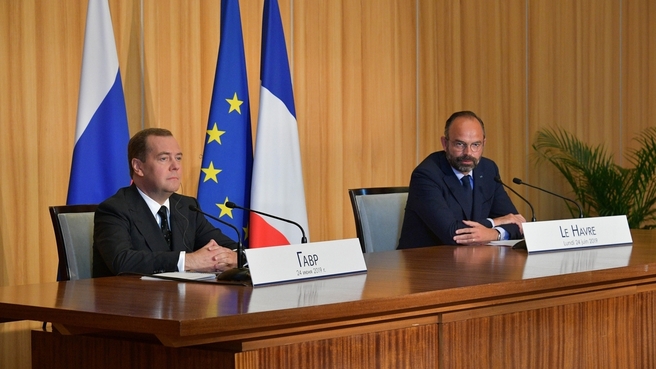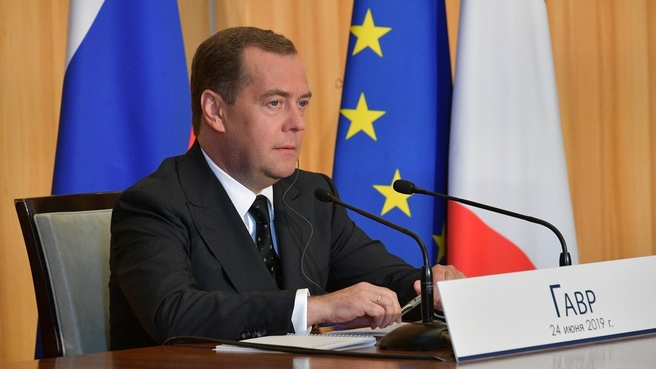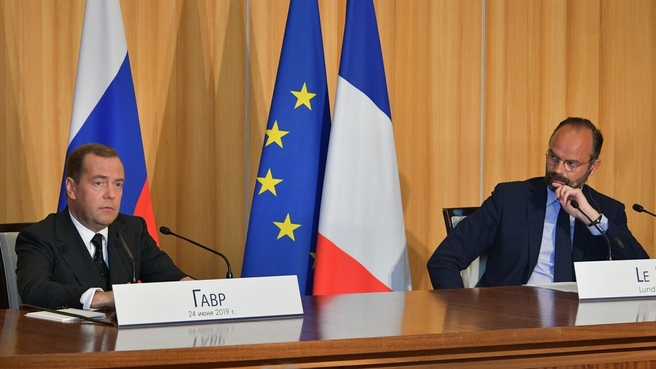Dmitry Medvedev held talks with Prime Minister of France Edouard Philippe.
News conference by Dmitry Medvedev and Edouard Philippe following talks
Edouard Philippe (via interpreter): Mr Prime Minister, I am very pleased to welcome you here in Le Havre.
I am particularly glad, because, on the one hand, this is linked to our oldest historical ties, and also because you, Mr Prime Minister, grew up in St Petersburg and I grew up in Le Havre, and we are aware of the special connection that has existed between our cities.
Mr Prime Minister, throughout my years as the city mayor I received my guests at the place where you are sitting now. Today, I am pleased to see you there.
Dmitry Medvedev: Mr Prime Minister, first let me thank you for the opportunity to visit Le Havre, your home city, and have our meeting here.
You were the mayor of this city for seven years; this is a difficult job. But the job of prime minister is also rather difficult. And I am glad to meet with you in your home city and discuss issues of mutual interest as well as Russia-France cooperation. It is very pleasing to see the talks beginning at such a beautiful place. A special thanks to you for [hosting them at] this location and the wonderful weather.
Edouard Philippe: Thank you, Mr Prime Minister.
<…>
News conference by Dmitry Medvedev and Edouard Philippe following talks
Excerpts from the transcript:
Edouard Philippe (via interpreter): Ladies and gentlemen, Mr Prime Minister, it is a pleasure to welcome Mr Medvedev here in Le Havre.
I would like to thank him sincerely for accepting this invitation. We are meeting for the first time as prime ministers. It was very important for me to hold this meeting in Le Havre, of course, for personal reasons that you all are probably aware of.
Friendship and closeness between our nations as well as our historical background and cultural ties are often mentioned. People often speak about Peter the Great’s visit to Le Havre in 1717 and how he was inspired by French architects’ know-how when building St Petersburg.
Of course, relations between our countries do not stop at relations between states. They are also based on our people, on our territories, our literary past and everything that leads us to Le Havre today.
You were raised in St Petersburg, Mr Prime Minister. Le Havre is a city where I spent many years. Today they are sister cities. These cities, of course, have something in common: port infrastructure.
I will use an example that all French people probably know. Everyone in France knows about Kusmi Tea, which was founded by Kousmichoff in 1867. The company moved here, to Le Havre, and has expanded and developed a lot since then.
Today’s meeting had two main goals: first, according to the desire of our President, the President of France, to give fresh impetus to our bilateral relations. You know that our countries share positions on certain international problems, sometimes our positions differ a bit, and there are some issues, some areas, where our positions are completely different. We speak about that openly, and, of course, this must be acknowledged.
However, sometimes we hear in France that perhaps France and Russia do not communicate enough; the dialogue is not enough. I would like to tell everyone who is ready to listen that this is not true. You know that right after taking office, President Macron invited President Putin to Versailles, and they maintain a regular dialogue, which is very demanding, intense and lively, but which allows us to move forward anyway. We always want these relations to continue developing. This is why, with our President’s consent, I invited my colleague to Le Havre. At today’s meeting, we discussed a range of international issues and some issues related to bilateral relations.
Our second goal was to examine ways to boost our economic relations. We must not forget that even if international sanctions affect economic relations, these relations still continue. France is the number one foreign employer in Russia. We can name such groups as Auchan or Renault. France was among the first foreign investors in Russia. I just want to emphasise how French companies are part of the Russian market and Russia.
The sanctions are not permanent; this is a phase that can be cancelled at any time. We know why these sanctions have been introduced, and I believe Russia knows, too. But we must use any opportunity to diversify our relations. We must enrich our know-how. Russia has announced an ambitious development plan until 2024, which includes 12 national projects. We would like to offer our cooperation and go beyond the historical strategic areas, where we already enjoy partnership and cooperation, and make it more dynamic.
The third goal of today’s meeting was to discuss international issues, primarily the developments in Ukraine. We believe that the election of a new president in Ukraine opens new opportunities for us and we should use them. We are doing this; I mean France and Germany. We firmly intend to develop the situation in a positive way thanks to the work done by the Normandy Four. We call on the Russian government to use the changes and the election of a new Ukrainian president to have the Minsk Agreements fully implemented.
Mr Medvedev and I also discussed developments in Iran and the current tensions in the Persian Gulf. We both emphasised that it was necessary to do everything to prevent any misstep that could escalate tensions. We understand this very well. Russia is an integral partner for us because we are permanent members of the UN Security Council, and as permanent members we are responsible for maintaining an open and intensive dialogue as well as for maintaining peace and international security. I was very happy to meet with Mr Medvedev today and would like to once again thank him for this honour and for our dialogue today.
Dmitry Medvedev: Mr Prime Minister, ladies and gentlemen, journalists,
Of course, I would like to thank my colleague, the Prime Minister of France, for his invitation to visit Le Havre and the warm welcome for our delegation in Normandy. And, of course, I invite Mr Edouard Philippe to pay a return visit to Russia. Once we are here in Le Havre, he should apparently be invited to St Petersburg. But we can discuss this separately.
This is our first meeting with the Prime Minister. I am happy that from the start it was a lively meeting and did not completely stick to the protocol; this is partly because we meet in your home city, Le Havre. You were mayor here for many years and did a lot for its progress.
You have already noted that Le Have is a sister city to my home, St Petersburg. These cities have many things in common. They are both ports that play an important role in transport services. They both suffered a lot of damage during World War II. As everyone knows, Le Havre was completely destroyed and then rebuilt. Many designs by architect Auguste Perret were used in Russia during wide-scale construction in the 1960s and 1970s.
Regarding the talks, Mr Prime Minister has said almost everything. It is true that we focused on bilateral cooperation, but also touched on international issues, which I will mention a bit later.
Bilateral cooperation: of course, this cooperation cannot be separated from the context of our relations with the European Union, because France is a member. But at the same time, despite a difficult period in relations with the EU, to put it mildly, it is important that our ties, relations between Russia and France, continue to develop. We have agreed that we must be more active and that we must look for new opportunities, including cooperation in new spheres. And, of course, we should think about how to use every cooperation format we can.
Mr Prime Minister said that our contacts have not been completely cut off. This is true, but, on the other hand, let me emphasise that we must use all our opportunities, because when we suspend one relation format or another, we make the future of relations poorer. And I don’t even know who we are punishing with this; maybe we are just punishing ourselves. We should remember this in the future.
Regarding the real results of our work, trade did decline, but it has grown over the last year, and the growth rate was not bad. While we have seen different dynamic over the first three months, I believe that our talks, among other things, will promote an improvement in this dynamic.
Today France is seventh among states investing in the Russian economy, and it is one of the top European countries. These are good indexes, but I believe there are ways to improve them, not to mention opportunities for Russian businesses to invest in the French economy.
French entrepreneurs’ interest in working in the Russian market is growing; over 500 companies operate in our country. We have a Consultative Council on Foreign Investment under the Russian Government, and every year I meet with foreign investors. They are large companies; 30 large international companies with a total capitalisation of about $2 trillion, including the largest French companies. We appreciate this very much. These companies are well-known and very large. I hope the number of these companies will grow.
Along with Total and Engie, we are implementing large projects in energy, such as Nord Stream, Yamal LNG and Arctic LNG 2. We believe they profit everyone, including European businesses, of course.
We cooperate in nuclear energy. Rosatom covers about one fourth of the French nuclear energy sector’s needs in uranium fuel.
We have good projects in industrial cooperation and aircraft manufacturing. This includes both the Sukhoi Superjet 100 and developing the MS-21 airliner. The Prime Minister has already mentioned the work of the Renault Russia company. It is indeed one of the largest foreign investors in Russian car making and a large employer, we appreciate this. In terms of localising production and import substitution they are the undisputed leader on the Russian market. I am sure that this position will not change and we will help make this so by adopting various decisions. The total Renault vehicle line on the Russian market is manufactured in Russia, and this is also an achievement in our cooperation.
There are some other promising areas. I would highlight energy efficiency, climate issues, digital development, in which we are all engaged, artificial intelligence, small and medium-sized business, which definitely requires attention.
We touched on people-to-people contacts. These issues have been very important for decades if not for centuries and our contacts have been numerous. We regularly exchange exhibitions, tours and film festivals. Recently there were Russian exhibitions in Paris, and last week the Pushkin Museum opened the exhibition “Shchukin: Biography of a Collection” in partnership with the Louis Vuitton Foundation. Next year, masterpieces of Russian and French art from Morozov’s collection will be displayed in Paris. We have had so-called cross years – a tourism year and a language and literature year. A regional cooperation year is next. We believe that all these features of people-to-people contacts are very useful.
We touched on international relations, as the Prime Minister has mentioned. This includes current issues concerning Iran, the tensions and the extremely negative background in the region at large. We discussed what can be done to try and eliminate the tensions. It is clear that to a large degree this is associated with the well-known US decisions to withdraw from the deal. But this means it is very important to maintain contacts, mutual understanding and opportunities to exchange views so as just to prevent a literal explosion in the Middle East.
We started to discuss some other topics, to be sure, including the situation in Ukraine and also in the context of the change of leadership in that country. I said that so far the new leadership, in my opinion, has not shown its worth in any way. However, at least we have not missed opportunities to take the right steps, restore the proper understanding of the Minsk process, use the most successful elements of the Normandy format and move toward the total pacification of the situation in Ukraine which is our nearest neighbour.
Certainly, our positions are different in many ways but this does not mean that there is no need to share information and approaches to stepping up our dialogue. The more so because we can see that the government of the French Republic and the president of the country spare no effort to this end. We believe that this is very useful on the whole.
Our contacts are not over yet, so I hope that we will be able to discuss a number of issues with my colleague during our visit to Le Havre where we have been invited. I hope we will be able to share other impressions about various issues, both bilateral and international.
I would like to thank Mr Philippe for this warm and informal reception and for the meaningful and positive talks. Merci beaucoup.
Question: This question is for both prime ministers. Mr Prime Minister of France, you said that it was wrong to call the level of cooperation and dialogue insufficient; however, after 2014, after the Ukrainian events a whole range of regular cooperation mechanisms, such as the inter-governmental council at the level of heads of government, the three plus two format at the level of defence and foreign ministers, and some other structures were actually frozen and have not convened since. After today’s talks, do you believe it possible to unfreeze the activities of these structures? Or might new cooperation formats emerge between Russia and France, either in addition to the existing ones or instead of them?
Mr Medvedev, a question for you on the same subject. Do you think that today’s talks can be considered a breakthrough in cooperation which was frozen after the Ukrainian events? And can we expect a breakthrough in economic cooperation and other spheres after these talks?
Edouard Philippe (via interpreter): The discussion that we had with the head of the Russian government cannot change the legislative framework, in which our states operate. On the other hand, we are not going to undo certain rules introduced in 2014. Mr Macron said he believed that bilateral relations between France and Russia and the quality of our contacts would reach a new level if we preserved the space for a dialogue. I was happy to receive Mr Medvedev’s invitation to visit St Petersburg. The Russian and French defence and foreign ministers will meet in the first half of September. I would like to stress once again that we need dialogue and dialogue in normal conditions. As for the legislative framework established by the European Union, it remains in force. I can only hope that all future decisions will change the situation for the better.
Dmitry Medvedev: I will add to what my colleague has said. As for cooperation formats, I spoke about this during the talks and I will share this with you as well. In my opinion, we can have different positions, which unfortunately happens quite often in international relations, we can argue, but we must not freeze channels of communication and break contacts, because this is the worst option. No wonder the statement has been made that currently the situation in the world is in some respects even worse than during the Cold War period. Why? Because there are no contacts. As a result, there is no trust and no chance to solve issues. Even when we had the USSR and very serious differences on positions and divergent ideological frameworks, we never blocked communication formats, even though representatives of the Western world, the US, very often used sanctions. Still we preserved communication at all levels. This is why I can say that I believe these decisions related to cancelling certain communication formats are a mistake. We certainly take it in stride. We are prepared to continue contacts at the level offered by our partners: either at the level of ministers or prime ministers. It is up to our colleagues whether we rebuild the whole communication format as an intergovernmental commission or if we add some other formats, because we did not block these formats and it is not for us to rebuild them. We are ready to communicate in any format.
You asked about cooperation. It has actually never stopped. Russia and France have very tight economic ties which cannot be broken even in this era of various sanctions and trade wars. Incidentally, in the face of trade wars and rampant protectionism these relations probably have become even more valuable because they help our companies develop and make money and help keep our economies feeling good.
But it is obvious that after all these processes began our trade and economic relations have also deteriorated. However, as early as last year we saw some growth and there is every chance that this year these favourable trends will be consolidated. That is why we have met here today, to promote such positive changes in economic cooperation. I hope that this meeting will give an impetus to further development of economic relations, including in investment.
Question (via interpreter): Radio France Internationale. Mr Philippe, two French nationals – Mr Le Gall and Mr Delpal – are currently imprisoned in Russia. How can you comment on this situation? What can France do in this situation?
Mr Medvedev, can you understand the public concern and consternation this causes in France? What guarantees can you provide in this matter?
Edouard Philippe (via interpreter): We have discussed this subject with the Prime Minister of Russia. Of course, we reminded him that France cannot interfere in the Russian judicial system in any way just as Russia cannot do it with respect to the French judicial system. This is clear to everybody. I have formulated the concern and the questions arising in our society. I think that he has heard my position, the position of France regarding our respect for the Russian legal procedure. I have also reminded him of the feelings such cases provoke in our society. And I would like to remind him of the conditions for the detainment of French citizens. Thank you.
Dmitry Medvedev: Yes, we discussed this issue. And that is absolutely normal. I raised the issue of the criminal prosecution of Russian businesspeople and Russian nationals in other countries on many occasions. It is always unpleasant but it happens sometimes. And in the case you are asking about, my colleague is absolutely right: this is a matter of the judicial system’s operation. This is why the only guarantees in this case can be the court’s authority and the verdicts that it delivers. This is the way it happens in any country, including the French Republic and the Russian Federation. The Prime Minister conveyed his concern regarding some elements of what is happening a. I heard this too. But, naturally, in the end the decision will eventually be made by the court under the current Russian criminal and criminal procedure laws. This is normal, as it happens in any country.
Question (via interpreter): It has been said that Europe needs a dialogue with Russia on security matters. How exactly will this proceed?
Edouard Philippe (via interpreter): As I have said on many occasions, it will be regulated within the legal framework and we will consider all the elements that in our opinion could help us fulfil the Minsk Agreements.
As for everything else, it seems to me that our bilateral relations do exist and should be developed. When we are talking about our dialogue we mean that it is necessary to prepare for the future and focus on the issues of mutual interest – Iran, Libya and other regions where peace and security are in question. As for all these regions, we should engage in a direct dialogue and hold it in an atmosphere of trust and, if possible, advance the situation along a positive tack. We are for a multifaceted approach in settling crises.
Question (via interpreter): Did you talk about the decision adopted by the Council of Europe …
Edouard Philippe (via interpreter): It’s a very simple question. France is committed to two principles. We are talking about the freedom of the press. This is an absolutely constitutional principle. This is a democratic level principle, this is a matter of French sovereignty and all journalists can avail themselves of the freedom of the press. And, of course, we have a strict approach towards any attempt, wherever it comes from the outside world, to interfere in the democratic process, whether on a national or international level. And it seems to me that I am simply speaking about common sense which directly bears on political matters. I think that more decisiveness is required on this issue.
Question (via interpreter): The European Commission report states that Russian sources are disseminating false information in Europe in order to somehow influence the outcome of the European elections. What do you think of that report? Did you discuss this issue at the talks today?
Dmitry Medvedev: We did not discuss this issue today. As for my thoughts, you see, each source of information, each media outlet must, to my mind, operate in a relevant legal environment. If we are talking about the French legal environment, the media must operate under French regulations. If we mean the Russian legal environment, they must operate under Russian regulations. All the rest is determined by professionalism, training, inner position, to a certain extent the likes and dislikes of the journalists that are dealing with it.
In general, the work of journalists is to a large extent subjective just because all journalists are human and can appraise different developments in a wide variety of ways. If they proceed within the available legal framework, are open and use reliable sources of information, then it is absolutely normal.
Edouard Philippe (via interpreter): Thank you.
















